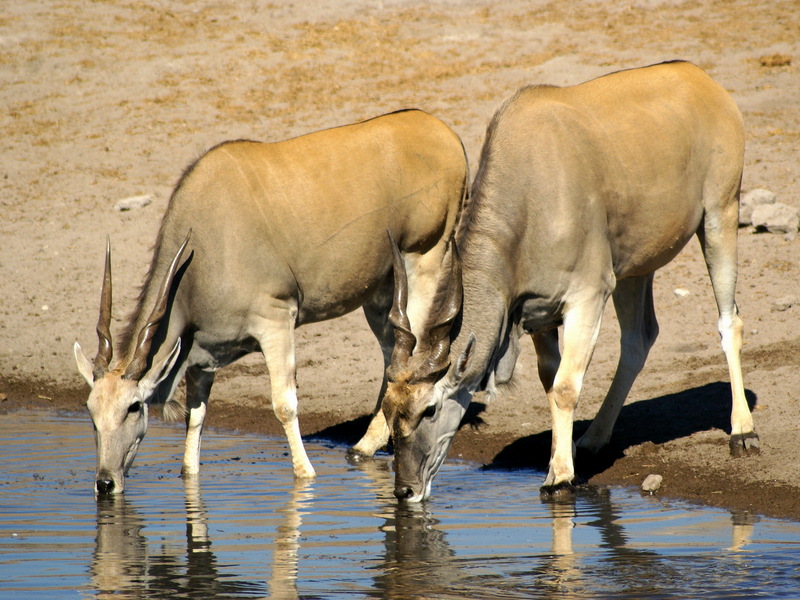|
| Query: blue antelope | Result: 8th of 48 | |
Common Eland (Taurotragus oryx) - Wiki
| Subject: | Common Eland (Taurotragus oryx) - Wiki
| |

| Resolution: 1403x1052
File Size: 614168 Bytes
Date: 2007:07:01 11:06:45
Camera: DSLR-A100 (SONY )
F number: f/6.3
Exposure: 1/1000 sec
Focal Length: 4000/10
Upload Date: 2007:08:03 10:19:42
|
Common Eland
From Wikipedia, the free encyclopedia
[Photo] Eland (Taurotragus oryx) at Chudop waterhole, Etosha, Namibia. Date 01/07/2007. Photo by Hans Hillewaert http://commons.wikimedia.org/wiki/User:Lycaon
The Common Eland, or Southern Eland, (Taurotragus oryx) is a savannah and plains antelope found in East and Southern Africa.
The Common Eland stands around two metres at the shoulder and weighs 275 kilograms (600 lb) to a tonne (2,200 lb). Females are sometimes less than half the weight of adult males. This species and the so-called Giant Eland, which are actually about the same size as the Common, are the largest of world's antelopes. Common Eland females have a tan coat, while the males' coat is a darker tan with a blue tinge to it, there may be a single white stripe vertically placed on the sides. The males have dense fur on their foreheads and a large dewlap. Both sexes have horns, which are about 65 centimetres (26 in) long and almost straight. The horns of the female are longer but thinner than those of the male.
Common Eland live on the savannah and eat grass, branches and leaves. They are diurnal but tend towards inactivity during the heat of the day. Herds are usually between thirty and eighty individuals but are known to reach upwards of four hundred. The Common Eland has an unusual social life. They come and go, taking advantage of herd life when they need to without forming close ties.
They "are very agile and can easily jump a 1.5 m fence from a standing start" (sign from Western Plains Zoo, Dubbo, NSW, Australia).
Predators taking adult Eland in the wild are predominantly Lion and African Wild Dog (Endangered).
Common Eland are sometimes considered part of the genus Tragelaphus, but it is usually categorised as Taurotragus with the Giant Eland.
Name
The name "eland" is derived from the Dutch word for elk (the animal called "moose" in North America). When Dutch settlers came to the Cape Province they named the largest wild ruminant herbivore they met with the name of the huge northern herbivore.
In Dutch the animal is called "eland antilope" to distinguish it from the elk.
http://en.wikipedia.org/wiki/Common_Eland
| The text in this page is based on the copyrighted Wikipedia article shown in above URL. It is used under the GNU Free Documentation License. You may redistribute it, verbatim or modified, providing that you comply with the terms of the GFDL. |
|
^o^
Animal Pictures Archive for smart phones
^o^
|
|

